|
|
|
Sort Order |
|
|
|
Items / Page
|
|
|
|
|
|
|
| Srl | Item |
| 1 |
ID:
084069
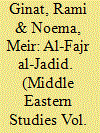

|
|
|
|
|
| Publication |
2008.
|
| Summary/Abstract |
This article claims that all of the objectives put forth by the Egyptian revolutionary regime appeared in the leftist journal al-Fajr al-Jadid several years prior to the July 1952 revolution. The authors' central claim is also that the essentials of Nasserism including its basic tenets neutralism, pan-Arabism, and Arab socialism were clearly articulated in al-Fajr al-Jadid. Although there is no clear-cut evidence to show the existence of neither political nor ideological direct links between Nasser and the al-Fajr al-Jadid's group, this article clearly demonstrates the existence of remarkable ideological textual similarities between Nasserite's and al-Fajr al-Jadid's revolutionary ideas.
|
|
|
|
|
|
|
|
|
|
|
|
|
|
|
|
| 2 |
ID:
180050
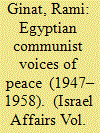

|
|
|
|
|
| Summary/Abstract |
This article sets out to closely scrutinise the main phases of the campaign for peace (1947–58) undertaken by left-wing Egyptian groups. Based on exclusive first-hand Egyptian communist primary sources – archival and others, it shows that although the communists were the only Egyptian political groups to support the November 1947 UN partition resolution on Palestine, President Gamal Abdel Nasser later, during the Bandung Conference (1955), followed suit yet no concrete official actions were taken by neither the Egyptian nor the Israeli political elites before the 1956 Suez War. Following that war, the prospects for an Egyptian–Israeli peace settlement were shut off for nearly two decades.
|
|
|
|
|
|
|
|
|
|
|
|
|
|
|
|
| 3 |
ID:
057759
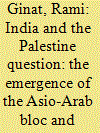

|
|
|
| 4 |
ID:
133308
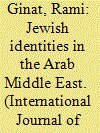

|
|
|
|
|
| Publication |
2014.
|
| Summary/Abstract |
Much work has been done in recent decades on the histories of the Jews of Arab lands across a variety of time periods, reflecting an increasing interest in the historical past of the Jews of the "Orient." While diverse, this literature may be divided into several general groups. The first comprises studies written by Western and Israeli scholars and encompasses a broad spectrum of Arabic-speaking countries. This literature has explored, among other things, issues relating to the way of life and administration of ethnically and culturally diverse Jewish communities, their approaches to Zionism and the question of their national identities, their positions regarding the Zionist-Israeli-Arab conflict in its various phases, and the phenomena of anti-Semitism, particularly in light of the increasing escalation of the conflict. It includes works by Israeli intellectuals of Mizrahi heritage, some of whom came together in the late 1990s in a sociopolitical dissident movement known as the Mizrahi Democratic Rainbow Coalition. The target audience of this movement was Mizrahi Jews: refugees and emigrants from Arab countries as well as their second- and third-generation offspring. The movement, which was not ideologically homogeneous (particularly regarding approaches to the resolution of the Israeli-Palestinian conflict), took a postcolonialist approach to the Zionist narrative and enterprise, and was critical of the entrenchment of the Ashkenazi (European-extraction) Jews among the elites of the emerging Israeli society. The movement had scant success in reaching its target population: the majority of Mizrahi/Sephardi Jews living in Israel. Nevertheless, it brought to the fore the historical socioeconomic injustices that many Jews from Arab countries had experienced since arriving in Israel, whether reluctantly or acquiescently.
|
|
|
|
|
|
|
|
|
|
|
|
|
|
|
|
| 5 |
ID:
124965


|
|
|
|
|
| Publication |
2013.
|
| Summary/Abstract |
The Egyptian public has witnessed in recent decades an active, at times heated, debate between present and former left-wing activists and a variety of Egyptian intellectuals over the role played by Jews in the communist movements. The polemic discourse particularly focused on their contribution to the failure of the various communist organizations to unite, expand and take root within the Egyptian lower classes in the first half of the twentieth century. This article scrutinizes and analyses, chronologically, the ongoing discourse as it came to be expressed in a number of important ideological venues. This lively polemic discourse sheds new light on the centrality of Jews in the development of organized communism during the monarchy period. It also adds an important dimension to the historiographic debate regarding the Jews of Egypt, generally, and their attitude towards Zionism and the State of Israel, particularly.
|
|
|
|
|
|
|
|
|
|
|
|
|
|
|
|
| 6 |
ID:
184339


|
|
|
|
|
| Summary/Abstract |
The Egyptian–Israeli peace treaty marked a new era in the history of the Arab–Israeli conflict. Relying methodologically on the history of ideas and diplomatic history, this article sheds light on the diversity of the perceptions and receptions of peace and relations with Israel as manifested by two influential Egyptian public opinion shapers who represented polar approaches—the mouthpiece of the Muslim Brothers—the journal Al-Da‘wa and Rūz al-Yūsuf, the semi-independent liberal weekly with a moderate left bias. The timeframe is 1977–1982—from Sadat’s historical visit to Jerusalem to the Israeli invasion of Lebanon and its impact on the budding Israeli–Egyptian relations.
|
|
|
|
|
|
|
|
|
|
|
|
|
|
|
|
| 7 |
ID:
079231
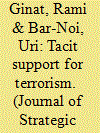

|
|
|
|
|
| Publication |
2007.
|
| Summary/Abstract |
This article demonstrates the inconsistent and wavering Soviet attitude towards national liberation movements in general and the Palestinian organizations in particular. Until the late 1960s, the Soviets viewed these organizations with suspicion, hesitating to engage in political dialogue with them. However, in the 1970s, political and military events in the region, as well as modifications in the Kremlin's Cold War strategies, led to a general shift towards the Middle East in Soviet foreign policy. Soviet leaders showed increased willingness to provide certain Palestinian organizations with arms with which to conduct terrorist activities against Israeli, pro-Israeli, Jewish and Western targets. The article explores the complex relations between Palestinian organizations and the USSR in the field of international terror. The study also exposes and analyzes the nature and content of Soviet-Palestinian arms dialogues and transactions. It provides clear evidence that Soviet policymakers and other luminaries were fully informed of, and sometimes directly involved in, these transactions and dialogues at the highest levels
|
|
|
|
|
|
|
|
|
|
|
|
|
|
|
|
|
|
|
|
|